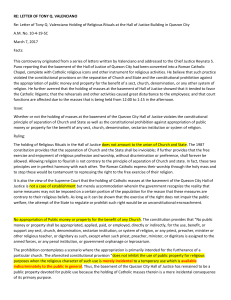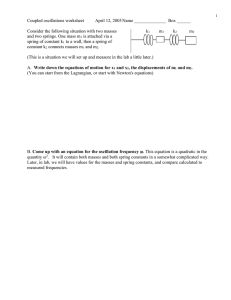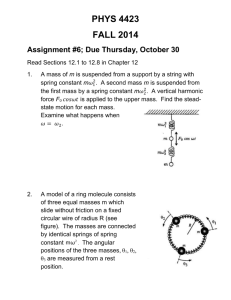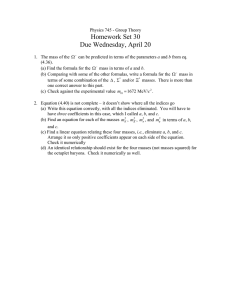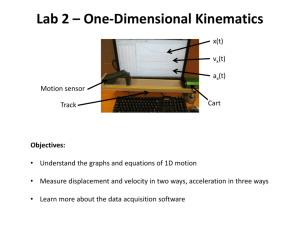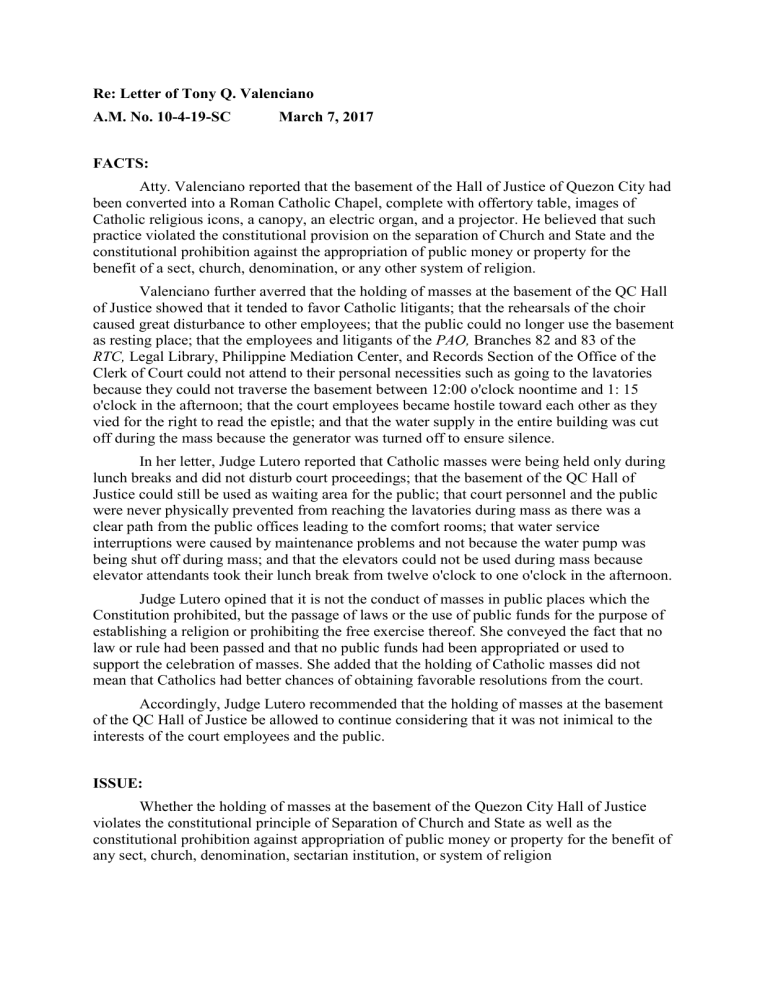
Re: Letter of Tony Q. Valenciano A.M. No. 10-4-19-SC March 7, 2017 FACTS: Atty. Valenciano reported that the basement of the Hall of Justice of Quezon City had been converted into a Roman Catholic Chapel, complete with offertory table, images of Catholic religious icons, a canopy, an electric organ, and a projector. He believed that such practice violated the constitutional provision on the separation of Church and State and the constitutional prohibition against the appropriation of public money or property for the benefit of a sect, church, denomination, or any other system of religion. Valenciano further averred that the holding of masses at the basement of the QC Hall of Justice showed that it tended to favor Catholic litigants; that the rehearsals of the choir caused great disturbance to other employees; that the public could no longer use the basement as resting place; that the employees and litigants of the PAO, Branches 82 and 83 of the RTC, Legal Library, Philippine Mediation Center, and Records Section of the Office of the Clerk of Court could not attend to their personal necessities such as going to the lavatories because they could not traverse the basement between 12:00 o'clock noontime and 1: 15 o'clock in the afternoon; that the court employees became hostile toward each other as they vied for the right to read the epistle; and that the water supply in the entire building was cut off during the mass because the generator was turned off to ensure silence. In her letter, Judge Lutero reported that Catholic masses were being held only during lunch breaks and did not disturb court proceedings; that the basement of the QC Hall of Justice could still be used as waiting area for the public; that court personnel and the public were never physically prevented from reaching the lavatories during mass as there was a clear path from the public offices leading to the comfort rooms; that water service interruptions were caused by maintenance problems and not because the water pump was being shut off during mass; and that the elevators could not be used during mass because elevator attendants took their lunch break from twelve o'clock to one o'clock in the afternoon. Judge Lutero opined that it is not the conduct of masses in public places which the Constitution prohibited, but the passage of laws or the use of public funds for the purpose of establishing a religion or prohibiting the free exercise thereof. She conveyed the fact that no law or rule had been passed and that no public funds had been appropriated or used to support the celebration of masses. She added that the holding of Catholic masses did not mean that Catholics had better chances of obtaining favorable resolutions from the court. Accordingly, Judge Lutero recommended that the holding of masses at the basement of the QC Hall of Justice be allowed to continue considering that it was not inimical to the interests of the court employees and the public. ISSUE: Whether the holding of masses at the basement of the Quezon City Hall of Justice violates the constitutional principle of Separation of Church and State as well as the constitutional prohibition against appropriation of public money or property for the benefit of any sect, church, denomination, sectarian institution, or system of religion RULING: NO. Section 6, Article II of the 1987 Constitution provides: “The separation of Church and State shall be inviolable.” The Court once pronounced that "our history, not to speak of the history of mankind, has taught us that the union of church and state is prejudicial to both, for occasions might arise when the state will use the church, and the church the state, as a weapon in the furtherance of their respective ends and aims." Justice Isagani Cruz expounded on this doctrine, viz.: The rationale of the rule is summed up in the familiar saying, "Strong fences make good neighbors." The idea is to delineate the boundaries between the two institutions and, thus, avoid encroachments by one against the other because of a misunderstanding of the limits of their respective exclusive jurisdictions. The demarcation line calls on the entities to "render therefore unto Caesar the things that are Caesar's and unto God the things that are God's." This, notwithstanding, the State still recognizes the inherent right of the people to have some form of belief system, whether such may be belief in a Supreme Being, a certain way of life, or even an outright rejection of religion. Our very own Constitution recognizes the heterogeneity and religiosity of our people as reflected in lmbong v. Ochoa. In Aglipay v. Ruiz, the Court acknowledged how religion could serve as a motivating force behind each person's actions. Thus, the right to believe or not to believe has again been enshrined in Section 5, Article III of the 1987 Constitution: Section 5. xxx. The free exercise and enjoyment of religious profession and worship, without discrimination or preference, shall forever be allowed. xxx. Free Exercise Clause Freedom of religion was accorded preferred status by the framers of our fundamental law. And this Court has consistently affirmed this preferred status, well aware that it is "designed to protect the broadest possible liberty of conscience, to allow each man to believe as his conscience directs, to profess his beliefs, and to live as he believes he ought to live, consistent with the liberty of others and with the common good." "The right to religious profession and worship has a two-fold aspect - freedom to believe and freedom to act on one's beliefs. The first is absolute as long as the belief is confined within the realm of thought. The second is subject to regulation where the belief is translated into external acts that affect the public welfare." Allowing religion to flourish is not contrary to the separation of Church and State. In fact, these two principles are in perfect harmony with each other. Clearly, allowing the citizens to practice their religion is not equivalent to a fusion of Church and State. No Compelling State Interest Religious freedom, however, is not absolute. It cannot have its way if there is a compelling state interest. To successfully invoke compelling state interest, it must be demonstrated that the masses in the QC Hall of Justice unduly disrupt the delivery of public services or affect the judges and employees in the performance of their official functions. The masses were being conducted only during noon breaks and were not disruptive of public services. The court proceedings were not being distracted or interrupted and that the performance of the judiciary employees were not being adversely affected. Moreover, no Civil Service rules were being violated. As there has been no detrimental effect on the public service or prejudice to the State, there is simply no state interest compelling enough to prohibit the exercise of religious freedom in the halls of justice. Accommodation, Not Establishment of Religion In order to give life to the constitutional right of freedom of religion, the State adopts a policy of accommodation. Accommodation is a recognition of the reality that some governmental measures may not be imposed on a certain portion of the population for the reason that these measures are contrary to their religious beliefs. As long as it can be shown that the exercise of the right does not impair the public welfare, the attempt of the State to regulate or prohibit such right would be an unconstitutional encroachment. Non-Establishment Clause Father Bernas further elaborated on this matter, as follows: "In effect, what non-establishment calls for is government neutrality in religious matters. Such government neutrality may be summarized in four general propositions: (1) Government must not prefer one religion over another or religion over irreligion because such preference would violate voluntarism and breed dissension; (2) Government funds must not be applied to religious purposes because this too would violate voluntarism and breed interfaith dissension; (3) Government action must not aid religion because this too can violate voluntarism and breed interfaith dissension; [and] (4) Government action must not result in excessive entanglement with religion because this too can violate voluntarism and breed interfaith dissension." Establishment entails a positive action on the part of the State. Accommodation, on the other hand, is passive. In the former, the State becomes involved through the use of government resources with the primary intention of setting up a state religion. In the latter, the State, without being entangled, merely gives consideration to its citizens who want to freely exercise their religion. It is our considered view that the holding of Catholic masses at the basement of the QC Hall of Justice is not a case of establishment, but merely accommodation. First, there is no law, ordinance or circular issued by any duly constitutive authorities expressly mandating that judiciary employees attend the Catholic masses at the basement. Second, when judiciary employees attend the masses to profess their faith, it is at their own initiative as they are there on their own free will and volition, without any coercion from the judges or administrative officers. Third, no government funds are being spent because the lightings and airconditioning continue to be operational even if there are no religious rituals there. Fourth, the basement has neither been converted into a Roman Catholic chapel nor has it been permanently appropriated for the exclusive use of its faithful. Fifth, the allowance of the masses has not prejudiced other religions.
